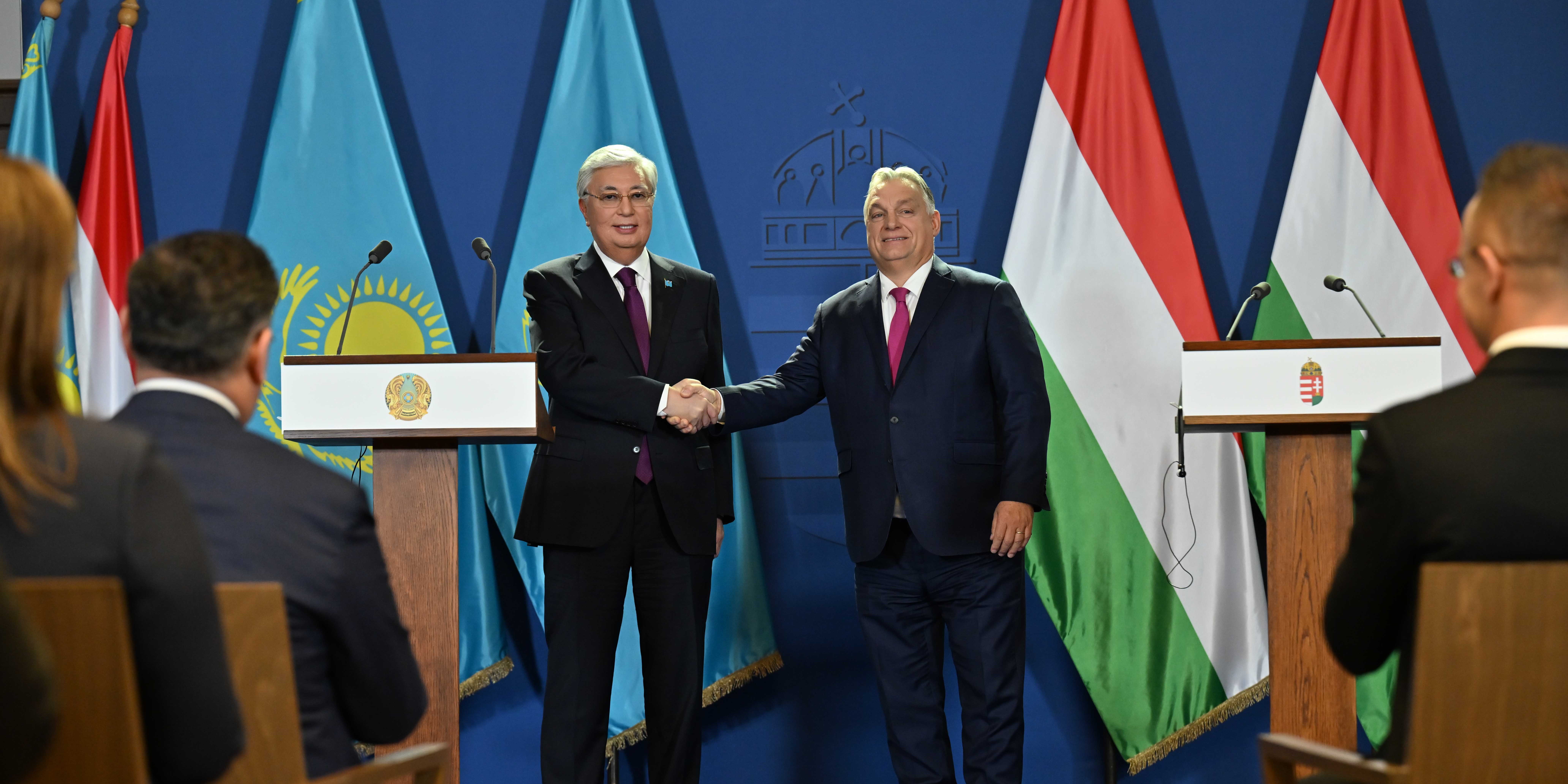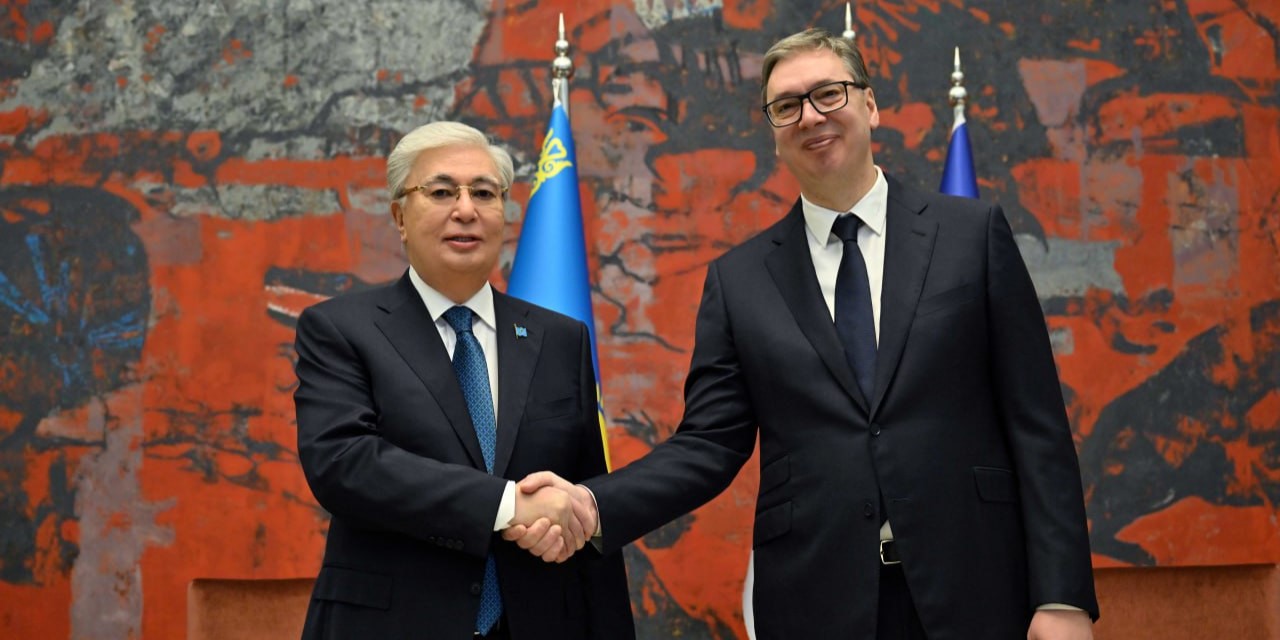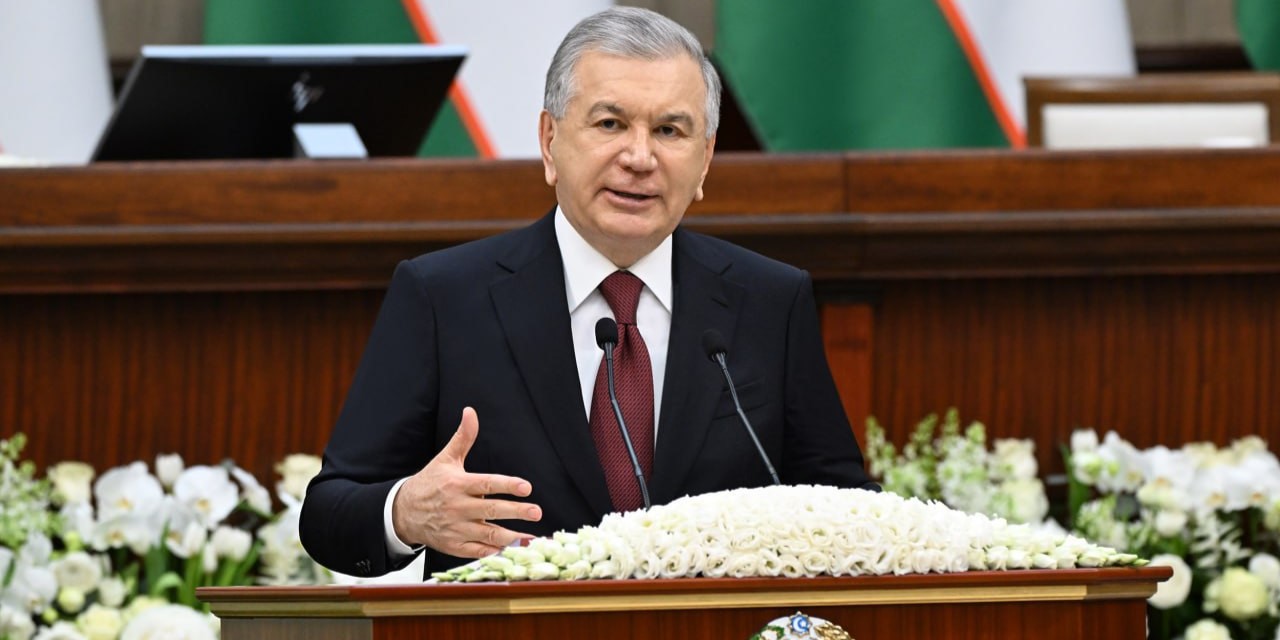This week, the media covered Kazakhstani President Kassym-Jomart Tokayev’s state visits to Hungary and Serbia. They also highlighted several new investment projects, such as the EBRD pledging $17 towards new water infrastructure in Kyrgyzstan, the World Bank and AIIB promising $650 million towards the Middle Corridor, and the ADB providing Uzbekistan with $250 million for its green transition. Several sources also explored Uzbekistan and Kazakhstan’s budgetary crises. Multiple outlets noted the mass deaths of seals in the Caspian Sea. The media also concentrated on the decrease in oil production at the Tengiz field and Kazakhstan’s planned auction of 26 critical mineral deposits.

At the invitation of the Hungarian side, President of Kazakhstan paid a state visit to Hungary on 20 November 2024. Source: Akorda
Diplomatic events:
On November 19, Kazakhstani President Kassym-Jomart Tokayev arrived in Hungary for a state visit (The Astana Times). Both leaders discussed various economic and political issues, including strengthening the strategic partnership between the two countries. Both countries have deep economic ties. The Hungarian energy company MOL group is part of the consortium that operates one of Kazakhstan’s largest gas fields, Rozhkovskoye. During the state visit, the head of KazMunayGaz, Askhat Khassenov, announced that both sides had agreed to triple gas production at the field (Kursiv). They aim to increase production to 700 million cubic meters annually. In the first ten months of this year, the field produced 222 million cubic meters. The company responsible for running the field, Ural Oil and Gas, is a joint venture between KazMunayGaz, MOL, and Sinopec. All sides have so far invested $534 million into the project, which is expected to contribute around $1 billion to Kazakhstan’s National Fund. Overall, trade between the two countries has seen steady growth, reaching $187.5 million in 2023, compared to $172.2 million in 2022, an increase of 8.9% (Kazinform).
While Kazakhstani exports to Hungary are down by 29.8% in 2024, imports from Hungary are up 7% to $128.3 million. Nevertheless, the Kazakhstani side announced plans to export 95 goods worth $700 million. During the visit, the leaders noted several examples of development cooperation, such as the $40 million Agriculture Direct Investment Fund and that Hungarian companies have invested over $300 million in Kazakhstan since independence. They also discussed increasing bilateral trade to $1 billion annually (The Astana Times). Several deals were also concluded. KTZ, Hungary’s L.A.C. Holding, and China’s Xi’an Free Trade Port Construction and Operation agreed to establish a rail cargo terminal in Budapest to increase capacity on the Middle Corridor (The Astana Times). The visit concluded with the signing of a joint declaration on strengthening their strategic partnership and several other initiatives (Kazinform).

At the invitation of the Hungarian side, President Kassym-Jomart Tokayev of the Republic of Kazakhstan paid a state visit to Hungary on 20 November 2024. Source: Akorda
During November 18-19, Kazakhstani President Kassym-Jomart Tokayev visited Serbia (The Astana Times). He held discussions with Serbian President Alexander Vučić and other Serbian officials. They elaborated on enhancing bilateral transport, energy, trade, and military-industrial cooperation. President Tokayev expressed gratitude for Serbia’s support during the Spring floods in Kazakhstan. Both leaders also supported the establishment of direct flights between Belgrade and Astana and restarting the Serbian Kazakhstani Business Council. During the visit, both sides also signed several documents. They signed an agreement on cooperation in defense and a memorandum of understanding on space cooperation, among others. The two presidents also toured a military exhibition, hinting at the growing defense cooperation between both countries (Kazinform).

Kazakhstani President Tokayev held talks with Serbian President Alexander Vučić during his visit to Serbia. Source: Astana Times
Investment
The EBRD is investing up to $17 million in Kyrgyzstan to finance various water infrastructure upgrades and improve the country’s water security (EBRD). The funds will renovate water supply networks, upgrade pumping stations, and install water meters in the Kemin and Shopokov districts. Wastewater treatment plants in Talas will also be upgraded. Overall, the investment consists of a €7.6 million loan and a similarly sized grant. The EBRD also pledged technical support to the tune of €1.8 million through the bank’s technical cooperation grant funds. EBRD Managing Director for Central Asia Hüseyin Özhan noted that the bank has supported 31 water projects in the country with investments worth €190 million.
Following on from reporting earlier this year, Kazakhstani fintech giant Kaspi has withdrawn its bid for Uzbekistan’s Humo payment system (Kun). In August, Kaspi had expressed interest in the privatization of the National Interbank Processing Center, the operator of the Humo payment system. While Kaspi stepped back from the deal, they reaffirmed their interest in Uzbekistan’s burgeoning digital economy.
The World Bank, in collaboration with the Asian Infrastructure Investment Bank (AIIB), has approved $650 million for Kazakhstan’s Transport Resilience and Connectivity Enhancement Project (TRACE) (Daryo). The TRACE project aims to improve connectivity along the Trans-Caspian International Transport Route or Middle Corridor, specifically along the Jezkazgan-Karagandy route. KazAvtoZhol National Company JSC will implement the project and develop climate-resilient road infrastructure. They will utilize improved road materials and add flood and snow barriers. The construction process will employ the most up-to-date standards on safety and climate resilience.
The Asian Development Bank (ADB) has agreed to provide Uzbekistan with $250 million to support the development of its green economy (ADB). The Accelerating the Climate Transition Program will focus on three crucial areas:
- Strengthening financial management institutions
- Enhancing climate resilience in water and land management
- Accelerating the green transition in the transport and energy sectors
The ADB Director General for Central and West Asia, Yevgeniy Zhukov, noted that Uzbekistan has one of the world’s most energy-intensive economies and that this program will help the country reduce greenhouse gas emissions per unit of GDP by 35% by 2030. The country’s water resources are threatened by climate change and poor management. The program will invest in modernizing water infrastructure and upgrading water management technologies. The program will develop policy coordination and provide target funding while increasing accountability.
Environment
Almost 2000 dead seals have been found along Kazakhstan’s Caspian coastline (Tengri News). The Zhaiyk-Caspian Interregional Basin Fisheries Inspectorate reported that between October 24 and November 18, 1155 seal carcasses were found on the shores of the Mangystau region. Another 834 carcasses were discovered following an additional search of the area on November 18. A definitive explanation will require months of laboratory investigations. However, the Fisheries Committee has attributed the deaths to natural phenomena, such as earthquakes releasing gas into the water. Nevertheless, the Committee for Veterinary Control and Supervision has already ruled out certain diseases. An Institute of Hydrobiology and Ecology expert, Assel Baimukanova, blamed marine pollution for the mass deaths. As reported earlier, mass deaths of seals and other wildlife have been more frequent in the Caspian Sea recently, with the seal population decreasing from one million a hundred years ago to around 70000 today.
Budget crisis
Similarly to most countries in the region, Uzbekistan anticipates running a budget deficit of around 3% of GDP or 49.3 UZS in 2025 (Kun). To cover the deficit, the government has announced plans to tap into several sources of revenue. Firstly, the government plans to secure 38.3 trillion UZS from international loans and Eurobonds. Secondly, 18.8 trillion UZS will be raised from global financial institutions to support state investment projects. Overall, they plan to attract $5.5 billion in loans, of which $2.5 billion will go to the state budget and $3 billion will be invested. The government will also issue 25.2 trillion UZS in treasury bonds. Privatization revenue and loan repayments to the state will contribute 10 trillion UZS and 3.1 trillion UZS, respectively. However, they also reported that the contributions of several significant taxpayers will decline in 2025. For instance, Uzbekneftegaz’s share of state revenue will decrease from 2.5% to 1.5%. Nevertheless, UzAuto will see its share increase from 1% to 1.3% as economic dynamics change (Kun). In 2024, the national debt is anticipated to grow to $39.7 billion from $34.9 billion in 2023. Nevertheless, the national debt is expected to surge to $45.1 billion or 32.1% of GDP by the end of 2025 (Kun).
Kazakhstan is also facing significant budget deficits (Vlast). On November 21, the Senate passed a new law that states the government can take $4 billion annually from the national fund between 2025 and 2027 (Vlast). According to the law, these are referred to as “guaranteed transfers,” but the government can also access “targeted transfers” without the consent of parliament. Targeted transfers must be allocated towards specific critical infrastructure projects (Kursiv). However, in recent years, they have been used to finance government spending, such as subventions to local authorities to fulfill specific projects. Transfers from the National Fund have reached record levels and are projected to reach $12 billion in 2024. The Senate has highlighted that the lack of clarity on transfers from the fund could affect Kazakhstan’s international credit rating. Indeed, they noted that foreign direct investment (FDI) was down 16% in 2023, and preliminary results from the first months of 2024 show investment is also down. However, the Fitch Ratings Agency has opted to maintain Kazakhstan’s credit rating at BBB (Kazinform). Nevertheless, the Senate sent the budget law back to the lower house for further revision and to consider limiting targeted transfers. Proposals for limiting the size of targeted transfers were also submitted to the cabinet by the head of the National Bank.
The International Bank of Reconstruction and Development (IRDB) will provide Kazakhstan with a loan valued at roughly $550 million to support the country’s financial sustainability and deficit spending (Kazinform). The Majilis approved the agreement, and it now awaits to be signed into law by President Tokayev.
This week, it was also reported that the state-run Samruk-Kazyna fund will not pay dividends on its $3.4 billion net revenue in 2023 (Kursiv). It stated that $100 million will be allocated to the Kazakhstan Halkyna charity fund, and the rest will be used for “financing investment programs, satisfying payment obligations and acquiring assets.” In January of this year, they paid $478.7 million in dividends for 2022 while making two separate payments of $925.2 million and $201 million to the state. Members of parliament have urged the government to insist on the transfer of all revenues generated from the semi-state sector to the budget to cover the deficit. However, Prime Minister Olzhas Bektenov noted their already significant contributions and that transferring all their funds would be unfeasible as they have other costs to account for.
Critical raw materials
The Kazakhstani Ministry of Industry and Construction has announced an auction of 26 gold, zinc, lead, silver, and other mineral deposits (Orda.kz). The auction will occur on January 29, and all details, protocols, and results will be published on the Ministry’s website. Potential buyers must fulfill specific requirements, such as committing to processing the ore in Kazakhstan. In related news, Kazakhstan announced a six-month ban on the export of steel billets and other semi-finished products in an effort to develop the country’s domestic production of higher-quality steel products, a sector that has experienced remarkable growth in recent years (Daryo). It also extended the ban on exporting scrap metal to bolster the country’s processing of raw materials. This reporting comes amid renewed focus on Central Asia’s critical mineral deposits. In 2023, the EU published a report on its critical raw material needs amid concerns over supply chain diversification (EU). Last week, Kyrgyzstan announced it would begin issuing new mining licenses after implementing a ban in 2019. This week, the Kyrgyzstani Deputy Minister of Natural Resources, Narynbek Satybaldiev, stated that reserves at the Kyzyl-Ompol mining complex could be four times greater than originally believed (24.kg). The deposit contains minerals like vanadium, zirconium, phosphorus, and titanomagnetite, which contains iron and titanium. Smaller amounts of uranium and thorium have been found on the site.
Migration
Uzbekistani President Shavkat Mirziyoyev announced that Uzbekistani citizens will soon be able to travel to Kazakhstan and Tajikistan with ID cards instead of passports (UZ Daily). Currently, such an arrangement only exists with Kyrgyzstan. President Mirziyoyev, in his address to the Oliy Majlis (Uzbekistan’s legislative chamber), outlined the need to develop good relations with neighboring countries. He also proposed adopting a new foreign policy concept focusing on ensuring regional stability.

Uzbekistani President Shavkat Mirziyoyev addresses Oliy Majlis on regional cooperation. Source: President.uz
Energy
Oil production at Kazakhstan’s largest oil field, the Tengiz oil field, has dropped by 28-30% to 61000-63000 tons per day (Daryo). The drop has been attributed to temporary repairs on the second generation plant, which are expected to be completed by November 23. It has been reported that production at Tengiz averaged 62,600 tonnes per day between October 26 and November 12, a significant decline from the 80,000 tonnes recorded between October 1 and 25. The operator of the field, Tengizchevroil (TCO), stated that exports through the Caspian Consortium Pipeline remain unaffected. The repairs are part of the company’s Future Growth Project, which aims to increase production by 12 million tons. In the first nine months of 2024, the field produced 21.4 million tons, a slight decrease from the 21.7 million tons produced in the same period last year.
Kazakhstan’s Alpha Wind, owned by Singapore-based Pluto Renewable Energy Investment Pte Ltd., has won a contract to build a 100 Megawatt wind farm in Kostanay (Kursiv). Another auction was held to select contractors to construct two small HPPs, each with an output of one megawatt. Kyzzhibek Ryszhanova’s Smart ReEnergy won the bid to build the plants. Other companies that won contracts to construct small HPPS include Turan Energy, Electrical Energy, Energia Zhetysu and its subsidiary, the Karatal HPP Company, and Koksu Hydropower.

